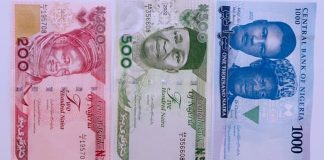As Nigerians withdraw large sums from deposit money banks, the total amount of demand deposits fell by N210 billion between January and March 2023. According to data from the Central Bank of Nigeria (CBN), demand deposits fell from N20.12 trillion in January 2023 to N19.91 trillion in March.
“A demand deposit is money put into a bank account with funds that may be withdrawn on demand at any moment,” according to the Corporate Finance Institute.
It was said that the depositor would generally utilize demand deposit monies to pay for day-to-day costs. The Corporate Finance Institute also stated that amid a financial crisis, many people would take huge sums from their bank accounts.
It added, “The withdrawals will lead to a decline in demand deposits and a decrease in the money supply, with banks left with less money to loan out.”
The significant withdrawal was caused by the CBN’s naira redesign program, which resulted in cash scarcity in the country. The approach seems to have resulted in a lack of faith in the financial system, with Nigerians withdrawing enormous sums and hoarding cash. Despite the CBN’s withdrawal limits, the withdrawals occurred.
The CBN stated in a circular released on December 6 that the maximum over-the-counter cash withdrawal limit for individuals and corporate organizations each week would be N100,000 and N500,000, respectively, with withdrawals exceeding these limits subject to 5% and 10% processing fees, respectively.
It also specified the weekly cash withdrawal limit through Automated Teller Machine. The apex bank also instructed banks to only load N200 and smaller denominations into ATMs. Many stakeholders objected to the directives, claiming that they would harm the economy.
The CBN finally caved in to public pressure and altered its cash withdrawal regulation. It increased the maximum weekly limit for cash withdrawals by individuals and business organizations across all channels to N500,000 and N5m, respectively. The CBN credited the progress to comments from stakeholders. For transactions exceeding the withdrawal limitations, financial institutions must get client information and upload it to the CBN site set up for this purpose.
Such information includes a valid means of identification of the payee (national identity card, international passport, or driver’s license), Bank Verification Number of the payee, Tax Identification Number of both the payee and the payer, and approval in writing by the managing director/chief executive officer of the financial institution authorising the withdrawal.
It was also noted that third-party cheques above N100,000 would not be eligible for payment over the counter, while the extant limit of N10m on clearing cheques still subsists.
The CBN urged banks to encourage customers to use alternative channels (Internet banking, mobile banking apps, USSD, cards/Pos, eNaira, etc.) to conduct their banking transactions. The CBN also said that it recognised cash’s vital role in supporting underserved and rural communities and would ensure an inclusive approach as it implements the transition to a more cashless society.













